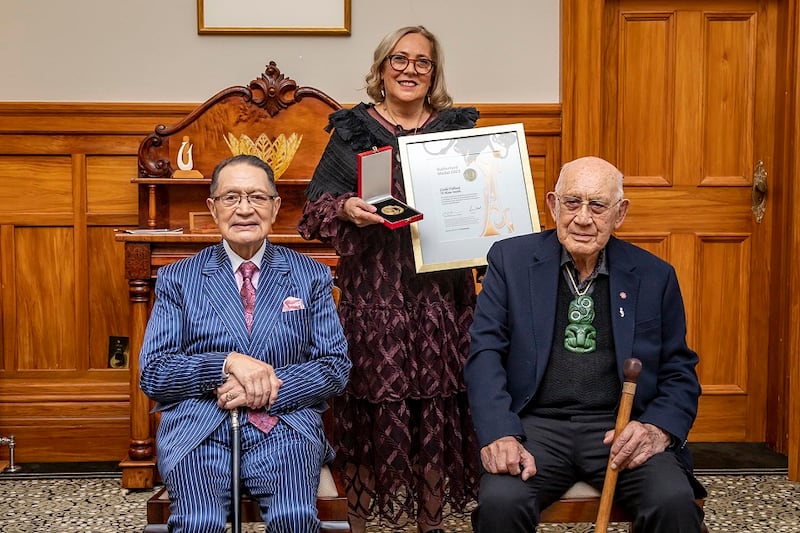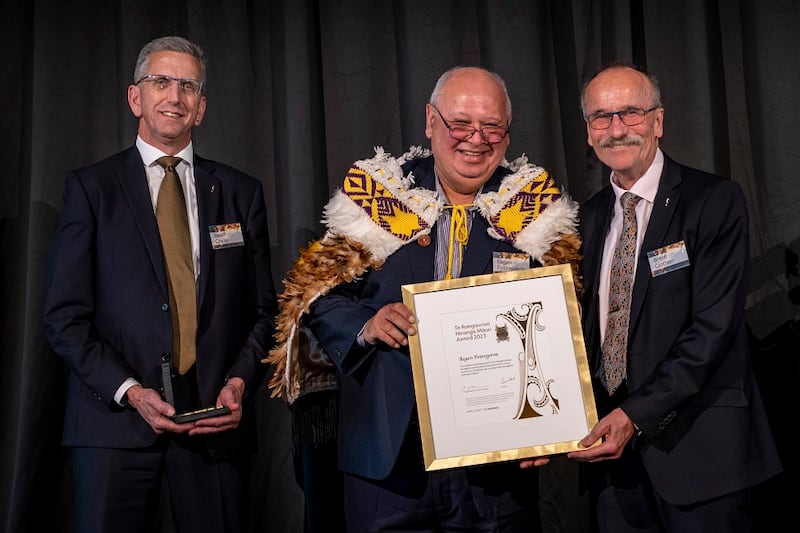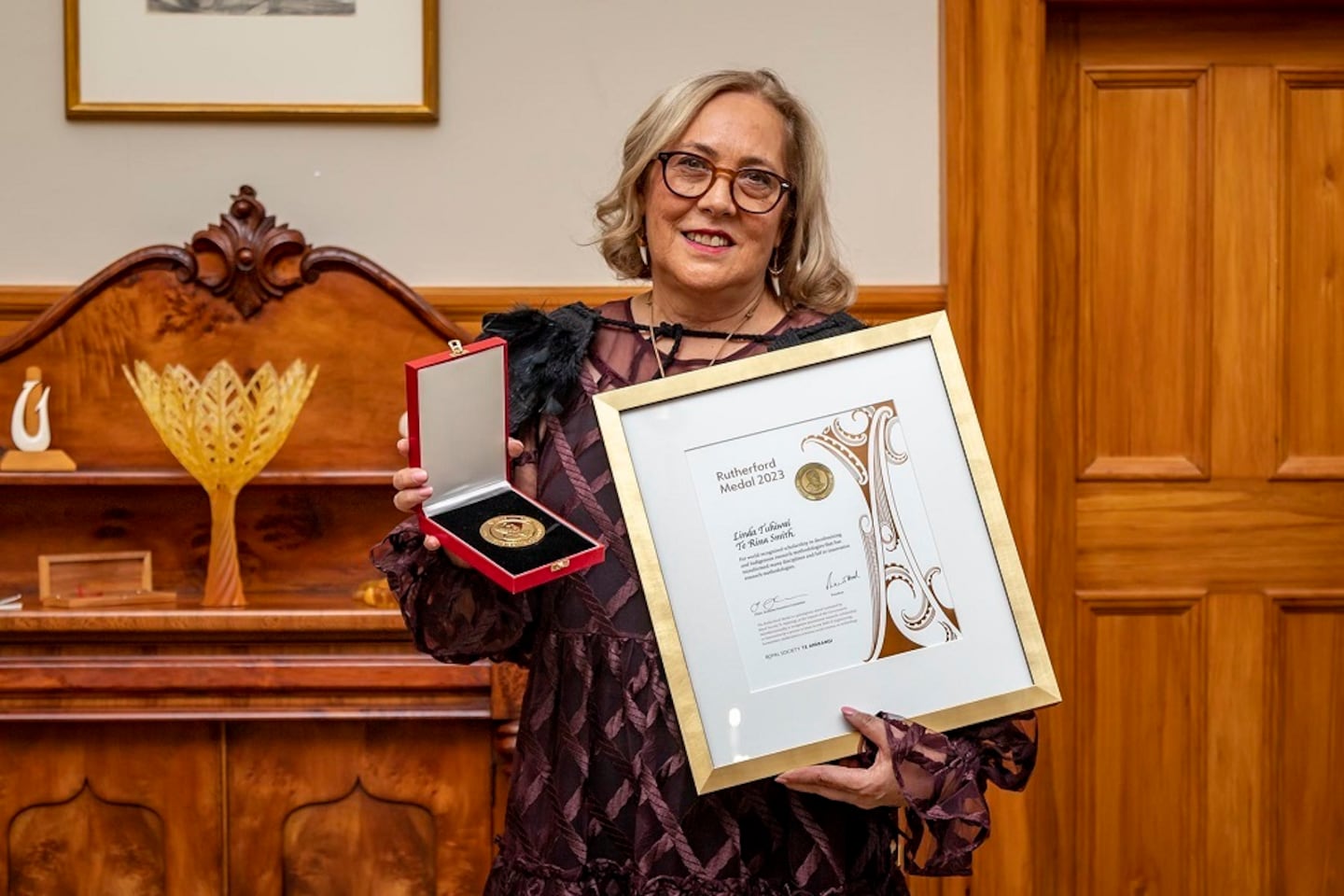Distinguished Professor Linda Tuhiwai Smith (Ngāti Awa, Ngāti Porou) was awarded the Rutherford Medal at an awards ceremony at Government House in Whanganui-a-tara Wellington on Thursday night but she admitted to feeling a bit conflicted.
She was recognised by the Royal Society Te Apārangi with its top honour for what it called her preeminent role in advancing education and research for Te Ao Māori, her groundbreaking scholarship in decolonisation of research methodologies, and her pioneering contribution to transforming research for indigenous peoples globally.
Te Apārangi said through Smith’s leadership in education and academia, she had changed the way that institutions work with Māori – to create intellectual spaces for students and researchers to embrace their identities and transcend dominant narratives.
Her scholarship had informed kaupapa Māori education, theory, and research; mana wahine feminist discourses; Māori research on health; and understanding of historical and intergenerational trauma.
“Okay, it always feels a little bit ironic in terms of the things that I talk about, and write about and research about, which is about decolonising, knowledge and systems, and to be recognised by those systems kind of does my head in a little bit,” Smith said.
“But I think it’s important for us for Māori, for indigenous peoples, to have our knowledge recognised, and to occupy and create spaces inside the big institutions of knowledge.

‘A lifetime commitment’
“So in that respect, I think it’s good for others who are coming who are working in mātauranga Māori spaces for example, that there’s hope and that their work really will matter and makes a difference to all of us.”
Te Apārangi said her publication Decolonising Methodologies, Research and Indigenous Peoples (1999) has had a profound influence across the social sciences. First published more than 20 years ago, the text continues to be used by Indigenous scholars globally, raking in 283,000 citations to date and being translated into five languages.
Smith, who is Distinguished Professor, rangahau and mātauranga capability at Te Whare Wānanga o Awanuiārangi, said she was brought up with an ethic of work “of being thorough, of sticking to that kaupapa (purpose) and not flitting around because it’s humongous, right?
“Our load is heavy and we need to do things thoroughly and persistently and it’s a lifetime commitment. And I don’t think I’m unusual.
“I look around me, I look at my kuia and kaumātua, I look at others in our community, and they commit a lifetime to doing what needs to be done for our people to thrive.”
Two more Maori scholars honoured
Last night Te Apārangi also awarded Dr Hinekura Lisa Smith (Te Rarawa, Ngāpuhi, Te Ati Awa) the Te Kōpūnui Māori Research award, which is given to early career researchers with a promising trajectory who are delivering innovative Māori research. She received the award for her PhD research titled Whatuora: Whatu kākahu and living as Māori women.
For this research, Smith worked with eight Māori women to prepare and weave kākahu, (traditionally made Māori cloaks).
During their making, her collaborators told stories of reclaiming, restoring, and revisioning ‘living as Māori’ for themselves and their whānau.
Whatuora emerged from the older practice of whatu (a weaving technique), as a theorised decolonising methodology. Whatuora offers a way to think about the transforming changes Māori women create for themselves and their whānau, through deliberate and conscious actions to”‘live as Māori”.
Te Apārangi said Smith’s work gave voice to Māori women’s efforts to reclaim and revision Māori ways of being which have been disrupted by colonial assimilation. Her whatuora methodology intertwines Mana Wāhine theory, Māori creative practice, and Māori and Indigenous knowledges.
A nomination supporter said she had made a distinctive contribution to Aotearoa’s research and practice through her “innovative scholarship at the interface of mātauranga Māori and the creative arts”.
“Dr Smith’s Whatuora research has been groundbreaking in several respects. One is that she theorises Indigenous methodologies through practice-based art rather than the ‘traditional’ Western academic written form. In so doing, Dr Smith really extends the boundaries of how we theorise and ‘do’ methodology and opens new avenues for inquiry within the wider field of Kaupapa Māori research.”
She has held professional and academic roles at the School of Māori and Indigenous Education, and Centre for Learning and Research in Higher Education at the University of Auckland. She is the director of Nga Wai, a Te Tui Māori and Indigenous Research Centre at UNITEC and a mem]ber of the senior research leadership team for Nga Pae o te Maramatanga Centre of Research Excellence,
In accepting the award she said: “Tēnei au ka mihi atu ki ōku tuākana rangahau, koutou rā i para i tēnei huarahi rangahau mā mātou e whai ake nei. E ōku rangtira tēnā rā koutou. I gratefully acknowledge my tuākana rangahau (research mentors) who cleared a kaupapa Māori research path that enables those that follow in their tapuwae (footsteps) to now add our own tapuwae to kaupapa Māori theory.”
She said from starting as a te reo Māori secondary school teacher, to PhD student, then academic, she never thought she would become a researcher.
“I don’t believe in the idea of an ‘accidental academic’. Instead, I think our tūpuna and tuākana put us in the places and spaces necessary for us to be in service and to create change – sometimes the reason is clear and other times it is not.”
Smith said she was grateful to her tūpuna and tuākana who nudged her where and when it was needed.
She thanked Te Apārangi Royal Society ”for recognising the transforming potential of toi Māori, creative practice and Kaupapa Māori, Mana wāhine- led research, with this prestigious early career award.”
“By elevating toi Māori from art and crafts to power pedagogical and methodological ways of being in the world, we recognise the inherent knowledge embedded and embodied within mātauranga Māori and toi practices.”
She said her final mihi was reserved for her whānau and the many wāhine who whatu alongside her: “Your stories and support are woven deeply into the fibres of every strand of my practice as a Kaupapa Māori researcher, artist, maker, and teacher. Whatuora ki a tātou!”

Emergency response and marae restoration
Professor Regan Potangaroa (Ngāti Kahungunu ki Wairarapa) of Massey University Te Kunenga ki Pūrehuroa, was awarded the Te Rangaunua Hiranga Māori Award after devoting his career as an engineer and architect to humanitarian deployments, emergency response efforts, and marae restorations.
Potangaroa’s diverse work has ranged from using drones to locate bodies which had been buried in unmarked graves in 1920 when Influenza swept through Wairarapa Māori to supporting the response and recovery for communities in Kaikoura after the 2016 Kaikoura earthquake, where his research informed the relocation of paua beds.
Potangaroa has completed more than 200 humanitarian deployments in 22 countries since 1996, and the Royal Society said his ethical approach to his work had formed the core of his academic research.
Following the devastating Cyclone Gabrielle earlier this year, Regan worked with Aohanga Incorporation – owners of Owāhanga Station, one of the largest landholdings in Wairarapa – to coordinate local relief efforts and provide support to ensure the safety and wellbeing of those affected by the storm.
“These efforts have made a significant impact on the community, demonstrating his unwavering commitment to supporting those in need,” a nomination supporter says.
He also served on the station’s management committee from 1983 to 1991 and was re-elected in 2022.
During his first stint, he was pivotal in stabilising the structure of Pāpāuma Marae, Tipuna Whare, built in 1905, at a time when the committee would have preferred that it “collapsed and disappeared”.
“Pāpāuma Tipuna Whare is now 117 years old, and work towards restoration of the wharenui continues. Regan’s expertise will play a significant role in the restoration of Pāpāuma,” the supporter says.
Recently, Potangaroa worked with the United Nations High Commissioner for Refugees as part of a shelter team in Bangladesh with the Rohingya Emergency Response.
Te Apārangi said Potangaroa brought his advocacy for sustainable and resilient built environments, developed from research in the humanitarian field, back to the marae. His community projects include ways to seismically strengthen and retain marae, avoiding large costs by using “whānau-isation”.
With about 70% of Aotearoa’s 1300 marae expected to have buildings classified as ‘earthquake-prone’ over the next 20 years, his approach of “whānau-isation”— the pooling of resources to take a hands-on, community-driven approach — could allow cost-effective renovations.
Potangaroa said there were about 40 marae across the nation that would be issued demolition orders under the 2017 Amendment Act for Earthquake-prone Buildings.
“I am working with three of them in the Wellington and Wairarapa region. The key to this work has been providing information to the users and marae committees involved so that they can make reasoned decisions about the way forward.”
He said hapū were previously being forced to demolish their marae, which made the work he was doing even more significant.
His expertise includes leading large teams in rebuilding after damage caused by disasters like the 2011 earthquake in Otautahi.
He has also produced highly regarded research on Māori wellbeing and provided Te Ao Māori expertise for research on intergenerational wellbeing, resilience, and disaster-risk reduction.
Through Massey University’s School of Built Environment, he is working with the International Federation of Red Cross and Red Crescent Societies, developing their capacity training for the incorporation of housing land and property issues into existing shelter and settlement programmes for the Asia-Pacific region.
Transformative leadership
Professor Nicola Gaston, of the University of Auckland Waipapa Taumata Rau, was awarded the Thomson Medal by Royal Society Te Apārangi for transformative leadership for the research, science and innovation sector and as a “driver of change’ towards equity for women in science.
Gaston is a Professor of physics whose research focuses on computational simulations of nanostructured systems. She is also co-director of the MacDiarmid Institute for Advanced Materials and Nanotechnology, a centre of research excellence.
The Royal Society cited Gaston’s significant, transformative leadership to research institutes and societies in Aotearoa New Zealand over the past decade. This included her roles as president of the New Zealand Association of Scientists and co-director of the MacDiarmid Institute, and her work as a ‘driver for change’ to increase equity for women in science, particularly through publishing her book, Why Science is Sexist.
Language revitalisation
Professor Stephen May FRSNZ, University of Auckland Waipapa Taumata Rau, has been awarded the Mason Durie Medal for his work on language rights and revitalisation, spanning the disciplines of applied linguistics, sociolinguistics, sociology, political theory, law, and education.
His research focuses on how modern nation-states can best manage diversity in this increasingly globalised and superdiverse age, particularly in relation to language and education policy, and in light of indigenous and multicultural obligations and commitments.
May is regarded as a world authority on language rights and has pioneered groundbreaking work in indigenous language revitalisation, bilingual education, critical multiculturalism, and the shift from a monolingual to a multilingual perspective in research, and the teaching and learning of languages (known as “the multilingual turn”).
Early career award
Dr Maria Armoudian, University of Auckland Waipapa Taumata Rau, was awarded the Royal Society Te Apārangi Early Career Research Excellence Award for Social Sciences for her research, leadership, and mentoring to advance the interconnected goals of sustainability, human rights, and good governance.
The society said her third book, Lawyers Beyond Borders: Advancing International Human Rights through Local Laws & Courts, represented the definitive work on the inception and development of a global movement to redress survivors of egregious human rights violations, such as genocide and torture.
Based on court records, government, NGO and media reports, and interviews with advocates and survivors, Lawyers Beyond Borders examines the 40-year pursuit to redress and restore human rights for people failed by international legal-political systems – and efforts to build new pathways to justice, using human ingenuity, ideas, and creative advocacy.




